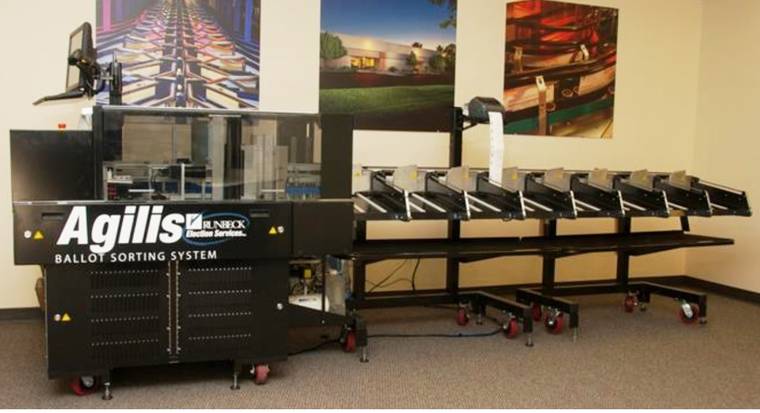Hawaii County Clerk Jon Henricks told state legislators Wednesday that the county will have a high-speed ballot sorting machine by February, which he said will give Hawaii Island elections workers “plenty of time” to prepare for the new voting-by-mail system that will be in place for the 2020 primary and general elections.
“It’s a very good machine. We had staff come to view the City and County of Honolulu’s machine, and they were sold on it,” Henricks said during a joint informational briefing of the state Senate and House Judiciary committees in Honolulu. “They’re essential, I believe, when you move to voting by mail because of the number of ballots.”
The vote-by-mail law, passed by the Legislature and signed June 25 by Gov. David Ige, is aimed at improving voter participation and ballot security. Officials also think the new system will save money in the long run.
“We wrote this bill to expand voting hours and access, and make it easier for everyone to vote. We hope to see voter participation rise this coming election,” said Rep. Chris Lee, an Oahu Democrat and chairman of the House Judiciary Committee.
Henricks said the Runbeck ballot sorting system, at an estimated cost of $225,000, will be paid for partially by the new elections law. The measure appropriated $830,731 to be split among the counties to help pay for equipment and training. Henricks added that the county expects to kick in some of its own funding but hopes there will be another state appropriation to cover elections expenses next year.
According to Henricks, mastery of the machine and system will require training, but he has “a very strong team in place.”
“We’re very confident that we going to be OK,” he said.
Henricks said the machine, which the manufacturer touts can process up to 18,000 ballots an hour, will be housed in a secure, climate-controlled room and won’t be connected to the internet, increasing elections security.
According to Henricks, an attractive feature of the machine is signature verification.
“Signature verification is a very time consuming task,” he said. “… The machine will expedite signature verification without sacrificing accuracy.”
Scott Nago, the state’s chief election officer, said registered voters will receive their ballots from their respective county clerk’s office approximately 18 days prior to the Aug. 8 primary election and Nov. 3 general election. Voter service centers, allowing for same-day voter registration and voting for previously unregistered voters, will be open 10 days prior to the primary and general elections.
Nago said voters need to return their ballots, either by mail, to the voter service center or to secure ballot drop boxes in time for their votes to be scanned and tabulated by 7 p.m. on Election Day.
“All voters will receive ballots in the mail, and polling places, as we know them, will no longer exist,” Nago said.
Nago said registered voters will receive a voter information card in the mail in January. He said those who don’t receive one should contact their county clerk’s office or go to the state Office of Elections website.
“If you didn’t receive a card, there could be something wrong with your registration,” he said, adding those with issues can re-register. Anyone with a valid Hawaii drivers license or state ID card can register online 24/7, he said.
He added that “ballots are not forwardable,” and those who move and don’t notify the office will not receive their ballots, so those individuals should update their registration.
Nago said voters also will be sent a signature verification card that must be signed and returned so the machines can verify their signatures on the ballots.
Absentee ballots will be available to Hawaii citizens who are out-of-state because of work or military commitments, he said.
Nago told legislators his office has begun outreach about the change to voting by mail, which he stressed is significantly different from the previous walk-in and absentee ballot voting. He said during a community meeting in Lahaina, Maui, there was confusion about the changes.
“A lot of voters didn’t realize that voting by mail (means) that voting would be strictly by mail and not at a polling place,” he said.
Rep. Joy San Buenaventura, D-Puna, vice chairwoman of the House Judiciary Committee, said she suspects “there’s going to be a learning curve … that there will be people standing in line on Election Day where they normally vote and expecting to be able” to vote.
According to Nago, a media informational campaign to acquaint voters with the changes will begin in April. Nago and Henricks said press releases also will be a part of the campaign, with Henricks saying a “clean, consistent message” is needed to make the transition as seamless as possible.
Henricks acknowledged the move might not be popular among older voters, such as his father, whom he said believes people should have to go to a polling place on Election Day to perform their civic duty.
He said he wants his father “to expect to receive a ballot in the mail instead of being surprised to receive one.”
According to Henricks, voter service centers will be in Hilo and Kona, with hours between 8:30 a.m. and 4:30 p.m. weekdays and Saturdays.
“We’ll put them in areas where people expect to see such types of services,” he said. He added that his office is “trying to figure out safe places for ballot deposit boxes.”
“Considering the magnitude of the change to our voting system, things are going well. I anticipate there will be hiccups,” said Sen. Karl Rhoads, an Oahu Democrat and chairman of the Senate Judiciary Committee. “… The Legislature, the Office of Elections and the county clerks will have to make adjustments as we roll out the new system.”
Email John Burnett at jburnett@hawaiitribune-herald.com.

